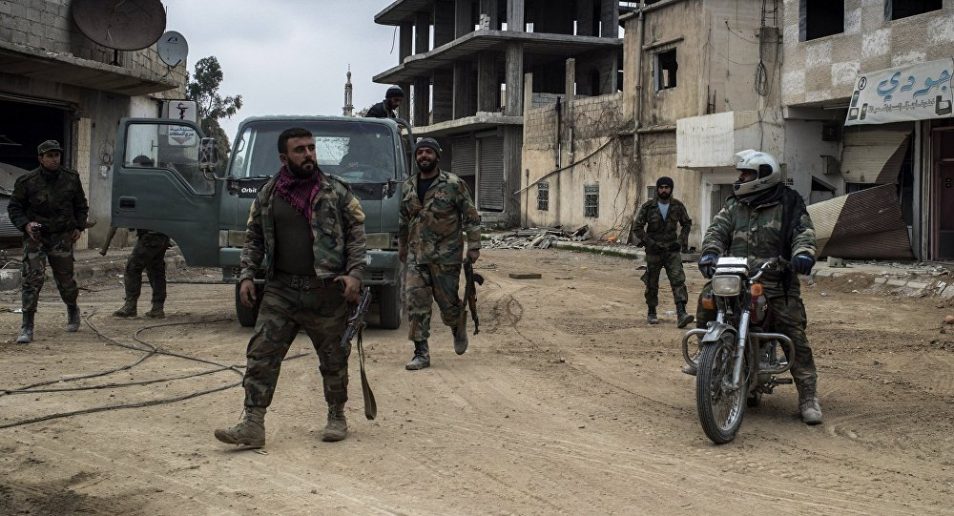Russia-Brokered Syrian Ceasefire Failure
July 11, 2018 | Expert Insights

The Syrian army and a rebel group in the southern province of Deraa have accused each other of breaching a ceasefire deal on 9th July.
The ceasefire deal, brokered by Russia on 6th July, required rebels to hand over heavy weapons in exchange for security guarantees and safe passage to other areas.
Background
In 1946, the modern state of Syria got its independence from France. A country of fertile plains, high mountains and deserts, it is home to diverse ethnic and religious groups, including Kurds, Armenians, Assyrians, Christians, Druze, Alawite Shia and Arab Sunnis. The majority of Muslim population in Syria is made up of Arab Sunnis.
The Syrian Civil War has been going on since 2011. It began during the Arab Spring protests and due to resentment towards the government of President Bashar al-Assad. The war is being fought by several factions: the Syrian government and its allies, a loose alliance of Sunni Arab rebel groups (including the Free Syrian Army), the majority-Kurdish Syrian Democratic Forces (SDF), Salafi jihadist groups (including al-Nusra Front) and the Islamic State of Iraq and the Levant (ISIL), with a number of countries in the region and beyond being either directly involved, or rendering support to one or another faction.
After 7 years on continuous asymmetrical warfare in Syria, President Assad has presently regained most of the sovereign territory of Syria back from either rebel factions or ISIS. Northern Syria has increasingly come under control of the Kurds who occupy the land, while the eastern Golan Heights had been illegally claimed by Israel decades ago.
Analysis
“Following negotiations mediated by the Russian Center for Reconciliation of Opposing Sides in Syria in the province of Deraa, agreements on the following issues have been reached: ceasefire, the start of heavy and medium weapons’ handover in all the settlements controlled by the armed groups,” Russia’s Defense Ministry said in a statement.
Russian assurance would also be extended to rebel fighters who wish to “settle their status” with the government: a process by which former insurgents accept to live under state rule again. Although the agreement mirrored earlier ceasefire deals, the rebels managed to secure a concession that some government forces would withdraw from the area. Those rebels who did not wish to live under government rule would move to the Northwestern provinces, according to rebel sources.
“The initial phases will cover the area along the border with Jordan, rather than the parts of northwestern Deraa around the city of Nawa,” Abu Shaima of the Free Syrian Army said. The process was expected to be overlooked by the Russian military police.
Opposition activists claim that the Syrian government air raids targeted a group of rebel fighters in Um al-Mayadin village, just 5km north of the Jordanian border, killing at least four people. The ceasefire’s provision for withdrawal of government forces was not enacted as of 8th July.
Less than 48 hours since the truce deal was reached, tens of thousands of displaced Syrians at the Nassib-Jaber crossing had left the Jordanian border and returned to areas in southern Syria, according to Anders Pedersen, the UN resident and humanitarian coordinator in Jordan. The Norwegian Refugee Council has called this the largest displacement of Syria’s seven-year war. However, Jordan, struggling with a crippled economy, has shut their border to refugees, but continued to distribute aid in the region.
Frédéric Pichon has called his recent book on the Syrian War ‘Une Guerre Pour Rien’, or ‘A War For Nothing’. In fact, it is much worse than that: the war has not only been for nothing, because none of the aims of the opposition have been achieved, but it also brought Syria decades backward in development and caused irreparable losses alongside social damage.
Counterpoint
Earlier ceasefires, brokered with the assistance of the UN, in Aleppo, Ghouta and other provinces have either never taken hold or have failed within days. Russia has often followed “pauses” in fighting which cannot be hailed as a victory as the timeframe has always been limited to few hours. Instead, gradual demilitarisation of interior provinces may be more successful.
Assessment
Our assessment is that the ceasefire’s gradual implementation may face hurdles as rebels expect immediate changes over incremental ones. We believe that the failure of the ceasefires may be attributed to the Syrian government’s outlook on the war: either the rebels must be obliterated or reintegrated into the very structure against which they rebel. We feel that foreign intervention in the region has reduced prospects for long-lasting ceasefire agreements.








Comments